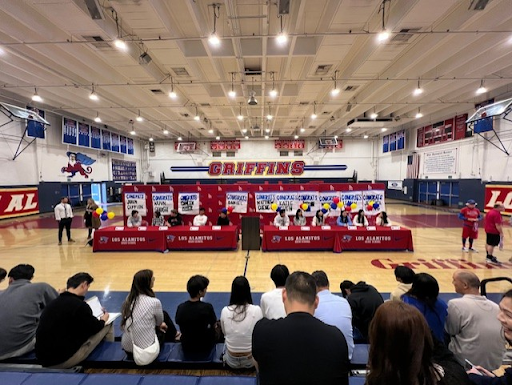LOS ALAMITOS, CA — Opening her bedroom door, Grace Lee, a junior attending Los Alamitos High School, sits at her desk at 11 p.m and begins her homework for her three AP classes. After a busy day of attending classes, playing at hockey practice, and reviewing struggling topics at an online tutor session, she works. Lee goes to sleep at midnight and wakes up at 5 a.m. In the morning, she begins her quick study session for her AP U.S. History quiz that requires her to read a whole chapter from the textbook.
On average, Lee manages to sleep an average of five hours per day, much less than the recommended amount for adolescents.
“Every day, I feel super tired because I’m always stressed and don’t have enough time to sleep,” Lee said. “Everything is always busy and I never have time to do much or sleep [as much].”
Millions of students experience the same phenomenon as Lee due to busy schedules and a lack of sufficient time. Throughout the day, students can experience severe cases of daytime sleepiness, damaged attention spans, and difficulty remembering basic material.
Adolescence is a stage that is marked by a person’s transition from childhood to adulthood, taking on the ages of 10 to 19 years old. As the process of puberty occurs, many adolescents shift their circadian rhythm, a 24-hour biological internal clock that regulates the bodily functions of sleeping and waking up, therefore creating a later sleeping schedule. This stage is when teenagers naturally prefer later bedtimes with early rising times due to biological preference.
A student’s natural circadian rhythm can experience minor to major shifts with the combination of natural events such as school, relationships, and approximate workload.
In a study taken from 46 Los Al students, 15 students record sleeping later than midnight. More than 30% of these students from the study report the main cause of late bedtimes as an abundance of homework and studying.
From this study, 39 students also report the use of electronic devices before they retire to bed. The use of electronic devices and the variety of entertainment apps like TikTok, Instagram, and YouTube can negatively impact sleep, as most teenagers spend the remainder of the night endlessly scrolling and watching videos.
Research has shown that technology such as phones, TVs, and computers emit a bright blue light that can disrupt the body’s melatonin levels. The sleep cycle fully depends on the release of melatonin in the body. Therefore, the more hours spent on technology before bed, the harder it will be to sleep at night.
“It’s impractical for the majority of us to completely delete technology from our nightlife. Instead, the best thing to do is to space out screen time with a dimmer screen light. Also, trying out occasional breaks from phones and locking the screen to prevent endless scrolling can act as quick and easy changes,” said the grandfather of a Los Alamitos student and former doctor, Dr. Hart.
A severe lack of the healthy amount of sleep can create mental health obstacles and increase the risk of anxiety and depression. Sleep deprivation exhausts the brain through difficulty in making decisions and acting on motivation. This will increase the risks of performing worse on school work and becoming more prone to emotional or aggressive outbursts.
“When I sleep at around 3 a.m., I notice a difference in my mood and how I act towards others. I’m definitely more snappy and irritable towards my friends and family, so I try my best to control myself when I can tell my sleep is less than normal,” said Los Al junior Daphne Lyons.
When student experience drowsiness and difficulty concentrating, many resort to caffeinated drinks to keep them awake and energized. Although caffeinated drinks can act as a quick fix and don’t inherently damage a person’s health, students should be wary of growing a major dependence on caffeine, as the drink should not act as a permanent solution to a severe lack of sleep. By delaying the real problem of lack of sleep, students can remain more prone to headaches and restlessness.
Students should remain informed about the power of sleep, as it can have a significant impact on their personal life. Best remember, Los Al students, sleep is key!












![It’s important to read [during the summer] because it gets you off screens and keeps your mind thinking about turning words into images. It helps with your imagination and depth of thinking, especially when learning concepts, said Henry Miller, a freshman.](https://lahsgriffingazette.com/wp-content/uploads/2024/05/unnamed-2-1200x900.jpg)



Katie A. • Feb 13, 2024 at 9:32 am
This is such an amazing article! I love how you conducted your own research and polls and you were able to connect multiple ideas under one main topic. Also, the feature photo is great!
Owen Silverman • Feb 12, 2024 at 2:11 pm
Great article, Jasmine! I love the usage of the data charts and I can tell you put a lot of time and effort into the research and writing of this article.